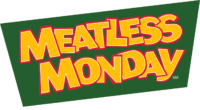Here’s Why Meatless Monday is Good for You and the Planet
When asked to picture a farm, many of us will imagine some bucolic landscape with rolling hills, acres of freshly-tilled soil, and maybe a worn wooden fence corralling some happy livestock.
But today, the reality of farming is much different. According to an article originally published on Mashable.com, industrial agriculture, specifically livestock production, is impacting the planet in unimaginable ways. Livestock is the cause of one-fifth of all climate change causing greenhouse gas emissions, according to a 2014 U.S. land use study, with cattle taking the greatest toll on the health of the environment. For example, each cow needs 28 times more land and 11 times more water than the average agricultural animal.
And that’s not all. Cows also release methane gas every time they burp, which is 25 times more effective than a carbon dioxide molecule at trapping heat in the atmosphere. Multiple this by the 1.5 billion cows on the planet and you have the potential for an environmental catastrophe and climate change related natural disasters. Cattle also require farmland, feed, and space to dispose of their manure. Together, these factors lead to deforestation, polluted water supplies, and vast quantities of animal feed, all of which tax the resources of our already over-taxed planet.
Meat and dairy remain staples of the American diet, but these sobering statistics are motivating individuals to reduce their consumption of animal products while increasing their consumption of plant-based alternatives.
Thankfully, the plant-based food industry is growing exponentially, with new versions of animal-free cheese, fish, milk, yogurt, and meat hitting the market every day. Programs like Meatless Monday encourage organizations, both public and private, to work towards introducing more plant-based menu options to motivate people to eat more fruits, vegetables, grains, and legumes.
